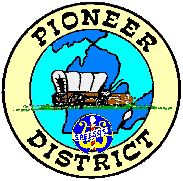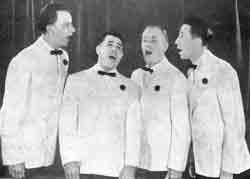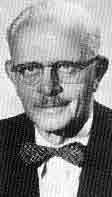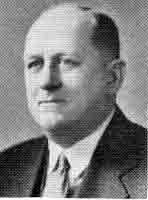


Notwithstanding the fact that World War II came upon the country, the Society continued its growth in Michigan during the years 1941 and 1942. Jackson, Caro, Oakland County (November 7, 1941), Battle Creek (November 12, 1941), Traverse City, Midland, Kalamazoo and Owosso were in the fold by the time of the 1942 national convention in Grand Rapids. It is kind of interesting to find out how barbershop chapters were started in those days. A good example can be found in the following letter sent to me by Carroll Adams in 1972. He states, "You and I could gossip for hours about the Oakland County Chapter. I never was as fond of any chapter as I always was of O.C.C. As you say, it was founded in 1941 at a dinner meeting in the banquet room of a downtown Royal Oak restaurant. Bill Otto then lived in Pontiac and I in Pleasant Ridge. Bill and I had invited 60 or 70 barbershop addicts of our acquaintance in that area. Thirty-two men showed up. Bill and I had guaranteed 50 dinners, so we had to dig into our pockets for the 18 meals at $1.75 each. In those days men belonged to several chapters. To start off, in 1939, Bill and I were members of the Detroit (Michigan #1) Chapter, and at one time Joe Wolff and I belonged to 16 or 18 Michigan chapters. We would become charter members of every chapter we had a part in organizing.
MICHIGAN GAINS STATURE—GRAND RAPIDS HOSTS OUR FIRST NATIONAL CONVENTION: Acoustical Persecutin Four
|
Grand Rapids staged the biggest and best convention yet held on June 19-20, 1942, and filled their Civic Auditorium with listeners for the big show. Our district also advanced musically when we placed five quartets in the finals. These were the DETROIT TURNERS, the HALL BROTHERS of Grand Rapids, the ACOUSTICAL PERSECUTIN 'FOUR of Jackson, PORT CITY FOUR of Muskegon and the GAY NINETIES of Kalamazoo. Other Michigan quartets in this contest were the PLEASURE FOUR, the STROLLERS, the AMERICAN LEGION FOUR, the BANNER FOUR (later to become the PROGRESSIVES and the FRANKENMUTH Quartet) and the DUBIOUS FOUR, all of Detroit, and the OLD TIMERS, the MUSKIE MUSKICHORDS and the SAWDUST FOUR of Muskegon; the ROUNDHOUSE FOUR and the DREAMERS of Grand Rapids, the STATE HIGHWAY FOUR of Lansing, the FOUR JEWELLS of Flint, the OWOSSO ELKS and the FOUR OAKS of Royal Oak. The reader may wonder how we had so many district quartets in the national contest. In those days there were no elimination contests and any quartet was eligible to compete. While this system, quite obviously, did not upgrade the standard of contest singing, it was more fun for everyone and particularly for the many quartets who entered for the fun of competing and not with the idea of taking honors. As Mark Roberts states, "In some way this system served the purpose of `preserving and encouraging' our kind of singing much better than the present arrangement because it provided fun, fulfillment and fellowship for a greater number of Society members." On the other hand, can you imagine the chaos we would have today if every quartet that wanted to could sing on the international contest stage? The contest would last six weeks!
Deac Martin's "Ten Year History of the Society" states that the dearth of top tenors made it necessary that we have a rule barring anyone from singing in more than one competing quartet, but this rule was not adopted until after the national contest at Grand Rapids. Mark Roberts mentioned that he sang with two quartets in that contest: the DUBIOUS FOUR with Tim Weber, Mort Gittleman, and Joe Wolff; and the finalist DETROIT TURNERS. As Mark Roberts mentions, "Maybe the officials decided that I was singing tenor, but I thought it was baritone. In any event, being the only Society member to sing with two quartets in the same national contest has not brought me a Nobel Prize, either for promoting harmony or interfering with it, and I mention it here merely because it is necessary nowadays to cling to whatever small distinctions that are left."
Another incident at Grand Rapids that year was that Jim Creed, well remembered for his high lyric tenor voice, sang in the preliminaries and finals without a tooth in his head. Jim's new dentures were not ready but he was, so he became the only "toothless tenor" on record in an international contest. As Mark further stated, "I never did find out how the Stage Presence Judges scored this lack of uniformity—three guys with teeth and one without—but an obvious correction under these circumstances would be for the other three members to have all their teeth yanked out!"
At the time of this contest, the entire judging system was still undergoing overhaul, and this contest was judged on the basis of harmony accuracy 25 percent, song arrangement 25 percent, voice expression 30 percent, song selection 10 percent and stage presence, including costuming 10 percent. As with everything else, progress is sometimes slow.
 Roscoe Bennett
|
Grand Rapids did itself proud in handling the national convention. Roscoe Bennett, the chairman, issued the first Society publication The Swipe publicizing the convention. This tabloid newspaper was loaded with information about the big events which were to take place in the Furniture City come June. Deac Martin, in his book, states: "The staff of the, then unborn, Harmonizer still thanks Bennett for his courage in reducing `quartette' with its long feminine suffix to the he-man `quartet' throughout The Swipe, a precedent which has released 1,483 man hours for better or worse while saving the Harmonizer more than a ton of paper. More issues of The Swipe, among 31 bona fide chapters and ten more which had not paid their national dues [Michigan alone had 13 live ones] helped to bring the registration to 60 quartets for the two day meet."
The Michigan quartet contest was not held in 1942 because of the fact that the national contest was held in Grand Rapids. However, the delegates did hold a meeting, and Joseph Wolff was elected state president and John Buitendorp of Muskegon was elected secretary. Joe Wolff made a strong talk at this meeting against commercializing barbershop singing; and this wise counsel should be heeded today when the product, all too often, is commercialized all out of proportion to our needs to preserve and encourage our kind of singing.
CARROLL ADAMS INSTRUMENTAL IN MOVING NATIONAL HEADQUARTERS TO DETROIT: Carroll P Adams
|
One of the best decisions ever made by SPEBSQSA was to appoint Carroll Adams as national secretary following his term as national president in 1942. While the rest of the district was busy singing and enjoying and not paying much attention to the administrative problems created by the rapid growth of the Society, Carroll was well aware of them and he proceeded to bring some order out of chaos by organizing an efficient national office. In the process, Carroll moved the Society, lock, stock and barrel to Detroit and established headquarters there and made Michigan the center of barbershopping. While Adams was surrounded here and assisted by a group of barbershoppers who were second to none in numbers, enthusiasm and dedication, it still was because of his vision, enterprise and hard work that Michigan became the leader in all things barbershop. While we have every reason to be proud of the history of the Michigan District and the many great barbershoppers who have contributed to this history, let us reserve a special niche for Carroll Adams, a truly great one.
| [index] | [1940] | [1941] | [1942] | [1943] | [1944] | [1945] | [Contents] |